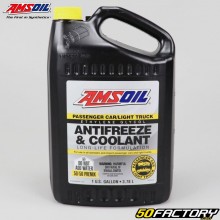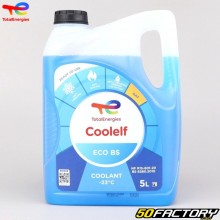 Coolant - pages 2
Coolant - pages 2
- IN STOCK165€30
- IN STOCK-39% 24,70 € 15€07
- IN STOCK50€40
Discover our guide to choose the right coolant for 50 motorcycle radiator and engine.
The purpose of coolant is to solve the harmful appearance of heat and hot spots in certain areas of the engine block.
It is an essential fluid for the operation of an engine. It circulates in the cooling circuit, absorbing the heat produced par the engine in operation, before rejecting it towards the radiator where it is evacuated into the air. Without it, the engine would overheat and suffer significant damage.
Operation and role of this fluid in the engine of your 50cc motorcycle
Engine temperature regulation
Its main role is to maintain the engine temperature at an optimal level. By absorbing the heat produced par the operation of the engine and by transferring it to the radiator to be evacuated, this fluid prevents the engine from overheating and helps ensure the proper functioning of your two-wheeler or quad.
Protection against frost and corrosion
In addition to its cooling function, it plays a protective role against freezing and corrosion. It has a freezing temperature much lower than that of water, which allows it to remain liquid in the event of extreme cold, avoiding damage that freezing could cause to your engine. It also contains anti-corrosion additives which protect the various elements of the cooling circuit.
The different types of solutions for cooling a 50cc motorcycle engine
The different acronyms
Type IAT (Inorganic Acid Technology) is the oldest and most classic coolant, green or blue in color. It is mainly composed of ethylene glycol and mineral corrosion inhibitors.
The OAT type (Organic Acid Technology), is composed of ethylene or propylene glycol and organic corrosion inhibitors. Red, pink, orange or yellow in color, this liquid offers better protection against corrosion and can be mixed with other types of liquid.
Type HOAT (Hybrid Organic Acid Technology), is a mixture of types IAT and OAT, and offers very good protection against corrosion. It is usually green, orange or pink in color.
Meaning of Cooling Solution Colors
The different colors of the coolants are not there par chance. They correspond to differences in the composition of the liquid and its properties. The color of the coolant can give an indication of the type of technology used (IAT, OAT, HOAT) and therefore its characteristics. However, caution should be exercised,ar color standardization is not systematic and may vary depending on the manufacturer.
Different Types of Coolant
To choose the right coolant, several criteria must be taken into account. Among these, the type of engine (with or without radiator, level of performance), the climate in which you use your vehicle (presence of frost in winter, high summer temperatures), and the recommendations of the vehicle manufacturer.
If there are different colors of coolant, rely more on the type of fluid listed on the container and its technology rather than the color.
There are three types of coolant, each with a threshold for resistance to extreme temperatures:
- Type 1 liquid freezes below -15°C and evaporates at 155°C;
- Type 2 liquid freezes below -18°C and evaporates at 108°C;
- Type 3 liquid freezes below -35°C and evaporates at 155°C.
Identify signs for product replacement
Visible symptoms
There may be signs that your coolant needs to be replaced. Among these, we can cite the presence of deposits in the expansion tank, a color of the fluid which becomes dull, a fluid level which drops abnormally or recurrent engine overheating.
The impact on the operation of your vehicle
Aging or improperly matched coolant can affect the proper functioning of your vehicle. This can manifest itself par higher fuel consumption, loss of power, engine overheating or even serious breakdowns.
Steps for draining and replacing
Changing the coolant requires a few steps. First, drain the used coolant, then flush the cooling system to remove any residue before adding the new fluid. This operation, although relatively simple, requires some precautions to avoid any risk of burns or contact with the skin.
WARNING: Never open the radiator cap to add hot coolant. Wait until the engine has cooled completely. Failure to observe this precaution could result in serious burns caused by:ar the liquid under pressure.
Mistakes to avoid when changing
It is important not to confuse the brake fluid reservoir and the coolant expansion tank. Additionally, don't forget to check the condition of the cooling circuit (radiator, hoses, pumps) before pouring in the new liquid. Finally, make sure you respect the maximum filling level indicated on the expansion tank.
Our selection of coolants
We have a wide choice of coolants suitable for all brands and types of engines. Among our flagship products, find the brands Amsoil et Evans, recognized for their excellent quality. You will also find products based on ethylene glycol or propylene glycol in our catalog, to meet all requirements.
Essential fluid to guarantee the proper functioning and longevity of your engine, each type of fluid has its characteristics and is suitable for specific uses. It is therefore crucial to be well informed and choose the right product according to your vehicle.
Remember to consult the other categories in the "oils and maintenance products" section to find all your parts: grease, chain grease and oil, gearbox oil, fork and shock absorber oil, transmission oil, air filter oil, 2T engine oil, 4T engine oil, coolant, brake fluid, lubricant, various maintenance products.

























































